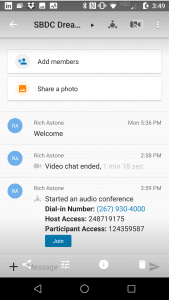If RingCentral is good enough for AT&T, It's probably a good fit for your business.
Earlier this month, PC Magazine ran an article about how AT&T and RingCentral were expanding their partnership in order to provide the AT&T Office@Hand service to more of their clients. Office@Hand is actually built on top of RingCentral. This is a great endorsement for RingCentral as AT&T would certainly trust only the best VOIP provider with their enterprise clients. But RingCentral is not only a good fit for large enterprises, it is a great fit for small businesses as well because of its flexible pricing model. If you are not familiar with it, RingCentral is a UCaaS (Unified Communications as a Service) VOIP provider. What this means is that from one number you can manage your calls, voice & video conferencing, fax, and chat messaging. RingCentral also provides your company with intelligent call routing through an easily administered automated attendant. Indeed, managing your organizations phone system becomes easier and more affordable with RingCentral because it is all managed in the cloud.
To be honest, 3 years ago I had never heard of RingCentral. In the process of starting up my cloud CRM business I began looking for toll-free providers. RingCentral was one of several that I researched. I was quickly impressed with its full range of capabilities as well as its affordability. I decided on the spot that not only would I be a RingCentral customer, I would also offer it to my CRM clients. That did require a few days of training to achieve the required RingCentral certifications, but the quality of their training confirmed in my mind that this was a company that does it right - building their technologies around an emphasis on good processes. And it's such a useful tool. For example, recently I've been meeting with a lot of new business owners through the Small Business Development Corporation of Arizona. Using RingCentral's free collaboration tool called Glip, I'm able to invite them to a Glip SBDC Team that I created. Now, not only can all members chat and share files with each-other, I can also initiate conference and video calls to the group from my smartphone.

Another feature that is great for small businesses is the distributed network. Some time ago, there was a member of the Raging Sanity team that needed to work from home. He simply took his desk IP phone home and plugged it into his network. After that, any caller that selected his extension, or any calls transferred to him from our main office would go right to him without any additional setup. This is just one of the benefits of having a phone system in the cloud.
While I’ve been focusing on the benefits for small businesses, RingCentral is also a leader at the enterprise level as well. They even have a robust call center solution.
Now there are some things to keep in mind when considering going to a cloud-based phone system. While voice is prioritized on properly configured networks, you do want to ensure that you network speeds and latency levels are acceptable. With today’s internet providers, this is almost never an issue in most places. Additionally, if you require a high level of QoS, you may consider getting a redundant internet service for those rare moments when your primary service might have an interruption. Also, if you use a traditional credit card terminal in your business, it is recommended that you keep one traditional (POTS) landline available for those transmissions.
If you’d like to learn more, check out the RingCentral section of our website. If you have questions about whether a cloud phone solution is right for your business, feel free to give us a call or message me at any time.


